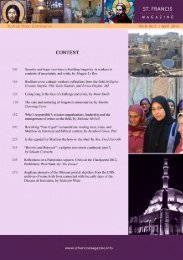download the pdf - St.Francis Magazine
download the pdf - St.Francis Magazine
download the pdf - St.Francis Magazine
Create successful ePaper yourself
Turn your PDF publications into a flip-book with our unique Google optimized e-Paper software.
<strong>St</strong> <strong>Francis</strong> <strong>Magazine</strong> Vol 8, No 4 | August 2012<br />
however, globalisation – manifested, for instance, in a ‘google-ized’<br />
world which reconfigures notions of both public and private spheres<br />
(categories alien to a Qur’anic worldview, but integral to C5 lived<br />
experience 24 ) – was meaning that “we can no longer present a different<br />
message or persona for each different audience.” (Love 2008a:<br />
33) Tensions, both internal and external to <strong>the</strong> debate, clearly<br />
abound.<br />
O<strong>the</strong>r responses to Tennent confirm this observation. Both Parshall<br />
and Hoefer agreed with <strong>the</strong> likelihood of C5 serving a transitional<br />
function (Travis et al. 2006: 125-126). Travis, however, saw<br />
four weaknesses within Tennent’s writing (Travis et al. 2006: 124-<br />
125), but none of <strong>the</strong>m addressed <strong>the</strong> substance of Tennent’s disagreement<br />
with C5. First, Travis saw it as largely <strong>the</strong>oretical and<br />
without any first-hand fieldwork and, second, that Tennent’s “<strong>the</strong>ological<br />
considerations” led him to generalise from only short sections<br />
of <strong>the</strong> literature. Also, he dismissed Tennent’s claim that adeceitfulness<br />
within C5 renders it unethical as “an extremely biased<br />
statement, spoken by an outsider.” Finally, Tennent, in Travis’<br />
view “does not take account of <strong>the</strong> changing world we are living in.”<br />
Regarding Tennent’s exegesis, Travis simply appealed to a generalised<br />
empirical observation that C5 ministries have happened, and<br />
are happening around <strong>the</strong> world.<br />
Criticisms almost naturally followed, fearing a minimising of <strong>the</strong><br />
Bible akin to North American seeker-driven ministries (Corwin<br />
2006, Piper 2006; cf. Corwin and Winter 2006, and <strong>the</strong> response<br />
from Travis and Travis 2006). While <strong>the</strong> search continued for ‘appropriate<br />
hermeneutics’ for coping with cultural diversity (Redford<br />
2005), o<strong>the</strong>rs countered what <strong>the</strong>y saw as an excessive appropriation<br />
of similarities without a commensurate assessment of dissimilarities<br />
(Waterman 2007, esp. 60), or an absence of wider <strong>the</strong>ological<br />
reflection informing C5’s developments of local <strong>the</strong>ologies (Corwin<br />
2007:54-55). For many, <strong>the</strong> question that was expressed in <strong>the</strong> Sep-<br />
24 Regarding Islam’s legal construals of public and private, see Ruthven (1997: 83-<br />
90). These constructions of identity within space and place are very different from<br />
those envisaged within <strong>the</strong> USA and o<strong>the</strong>r western democratic systems of law.<br />
<strong>St</strong> <strong>Francis</strong> <strong>Magazine</strong> is a publication of Interserve and Arab Vision 474







![Reflections on Surah Fatiha and the Lord's Prayer[1] - St.Francis ...](https://img.yumpu.com/49377951/1/184x260/reflections-on-surah-fatiha-and-the-lords-prayer1-stfrancis-.jpg?quality=85)









